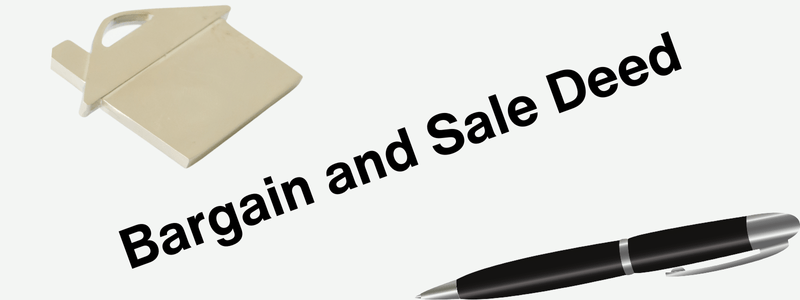
If you’ve ever been involved in a real estate transaction, you’ve likely encountered several different types of property deeds. One that tends to pop up, especially in certain regions or specific transactions, is the Bargain and Sale Deed. But what exactly is this type of deed, and why should you care? In this guide, we’ll break down everything you need to know about Bargain and Sale Deeds, how they work, and when to use them. So, let’s dive in!
What is a Bargain and Sale Deed?
A Bargain and Sale Deed is a legal document used to transfer ownership of real estate from one person (the seller) to another (the buyer). Unlike other deeds, such as a warranty deed, a Bargain and Sale Deed does not offer any guarantees or warranties that the property is free from claims or liens. In simpler terms, the seller transfers the property to the buyer “as is.”
Historically, this type of deed originated in England and was often used in situations where property was transferred between parties who were already familiar with the property’s condition and status.
How Does a Bargain and Sale Deed Work?
The Bargain and Sale Deed involves two key parties: the seller (grantor) and the buyer (grantee). The seller essentially transfers their interest in the property to the buyer, but without making any promises about the condition of the title. The buyer is taking a bit of a gamble, hence the name “bargain.” The key characteristic of this deed is that the seller is not guaranteeing that the title is free of defects or encumbrances.
Bargain and Sale Deed vs Other Deeds
There are a few other types of deeds commonly used in real estate, and it’s essential to know how the Bargain and Sale Deed differ from them:
General Warranty Deed
A General Warranty Deed provides the highest level of protection for buyers. The seller guarantees that they hold a clear title and will defend the buyer against any future claims. This is quite different from the Bargain and Sale Deed, which offers no such assurances.
Special Warranty Deed
A Special Warranty Deed is similar to a General Warranty Deed but with a key difference: the seller only guarantees the title for the time they owned the property, not before. It offers some protection, but again, more than a Bargain and Sale Deed.
Quitclaim Deed
A Quitclaim Deed is perhaps the most similar to a Bargain and Sale Deed. Like the Bargain and Sale Deed, the seller makes no guarantees about the property title. However, a Quitclaim Deed is often used to transfer property between family members or in cases where the buyer is aware of potential title issues.
When Should You Use a Bargain and Sale Deed?
You might use a Bargain and Sale Deed in specific circumstances, like when buying property through a foreclosure or tax sale. It’s also commonly used when the property is being transferred between familiar parties, such as family members, where the buyer is already aware of any potential title issues.
Legal Implications of a Bargain and Sale Deed
While a Bargain and Sale Deed transfers ownership, it doesn’t provide the buyer with the same legal protections as a warranty deed. This means the buyer is responsible for conducting thorough due diligence on the property title before completing the transaction. The buyer assumes all risks related to liens, claims, or disputes over the property.
Risks Associated with Bargain and Sale Deeds
One of the biggest risks with a Bargain and Sale Deed is that there are no warranties provided. If there are issues with the title—such as outstanding liens or ownership disputes—the buyer is responsible for resolving them. This lack of protection can lead to costly legal battles down the road.
Steps to Create a Bargain and Sale Deed
Creating a Bargain and Sale Deed typically involves:
- Drafting the deed with the proper legal language.
- Including the names of the grantor and grantee.
- Describing the property being transferred.
- Signing the document in front of a notary public. It’s crucial to ensure that the document meets all state legal requirements to be valid.
Recording a Bargain and Sale Deed
Once the deed is signed, it needs to be recorded at the local county recorder’s office. Recording the deed makes the property transfer public record, which is vital for protecting your ownership rights.
Costs Involved in a Bargain and Sale Deed
Costs associated with a Bargain and Sale Deed include:
- Legal fees for drafting the deed.
- Recording fees are charged by the county. These fees can vary depending on your location, so it’s wise to budget for both.
How a Bargain and Sale Deed Affects Title Insurance
When using a Bargain and Sale Deed, it’s important to obtain title insurance. This protects the buyer from future claims or disputes regarding the property title, offering peace of mind that a Bargain and Sale Deed alone cannot provide.
Bargain and Sale Deed in Foreclosure Situations
In foreclosure situations, a Bargain and Sale Deed is commonly used to transfer property from a foreclosing lender to a new buyer. The buyer accepts the property with any existing issues, so caution and title insurance are essential.
The Role of a Lawyer in Bargain and Sale Deeds

Given the potential risks, it’s highly recommended to consult with a real estate attorney before using a Bargain and Sale Deed. A lawyer can help ensure the deed is properly drafted and that you are aware of any potential title issues.
Pros and Cons of Using a Bargain and Sale Deed
Pros
- Easier and faster for transfers between familiar parties.
- It can be cost-effective for simple property transfers.
Cons
- There are no guarantees or warranties regarding the property title.
- Potential for undisclosed liens or claims on the property.
Conclusion
In summary, a Bargain and Sale Deed can be a useful tool for specific real estate transactions, but it comes with risks that buyers need to be aware of. Without any warranties, the buyer takes on more responsibility to ensure the property title is clean and free of issues. Always consult with a professional before proceeding with this type of deed.
FAQs
1. What is the difference between a Bargain and Sale Deed and a Warranty Deed?
A Warranty Deed guarantees that the seller holds clear title, while a Bargain and Sale Deed offers no such protection.
2. Can I use a Bargain and Sale Deed for residential property?
Yes, but it’s more common in foreclosures, tax sales, or transfers between familiar parties.
3. Are there any risks to the buyer with this type of deed?
Yes, the main risk is the lack of guarantees, which means the buyer could face title issues.
4. Do I need a lawyer to create a Bargain and Sale Deed?
It’s highly recommended to consult with a lawyer to ensure everything is properly drafted and recorded.
5. How do I ensure the property title is clear before using a Bargain and Sale Deed?
Conduct a title search and purchase title insurance to protect against future claims.
For more insights on property ownership, check out our article on Grant Deed: An Essential Guide for Property Owners.
